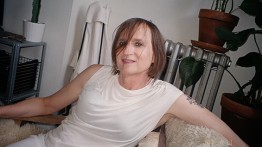Architectures of Transition | McKenzie Wark: From Architecture to Kainotecture
Wednesday, September 14, 2022, 12 - 2pm

Image courtesy of Z. Walsh.
This lecture will be conducted in-person in room 315F and through Zoom.
For Zoom attendance, please register in advance here.
For In-Person attendance, please register in advance here.
Perhaps the whole idea of architecture implies a certain kind of stability, or the possibility of a stabilization, that is connected to the Holocene epoch, an epoch in which we no longer dwell. How then to think about built form outside of the assumptions of that stabilization. How to think about built form for a qualitatively different time (kainos)? Prof. Wark wants to bring two very different kinds of experience to thinking about this. One is from architecture's opposite—warfare. What was the built form of the D-day invasion? How was it conceived and executed? The other is from the more local and particular forms of queer and trans mutual aid and mutual care. How do people who were mostly excluded from the expectations of a stable time build lives together?
The presentation will be followed by a conversation moderated by Elisa Iturbe.
McKenzie Wark is professor of culture and media at The New School. Her books include The Beach Beneath the Street (Verso), Molecular Red (Verso) and the forthcoming Raving (Duke). She is currently coediting a special issue of eflux journal called Black Techno | Queer Rave.
Elisa Iturbe is Assistant Professor at the Cooper Union. Her research is currently focused on the relationship between energy, power, and form and her writings have been published in AA Files, Log, Perspecta, Antagonismos, New York Review of Architecture, and more. Iturbe is also co-founder of Outside Development, a design and research practice.
This event is free and open to the public. Registration is required.
View the full Fall 2022 Lectures and Events List.
Located at 7 East 7th Street, between Third and Fourth Avenues




